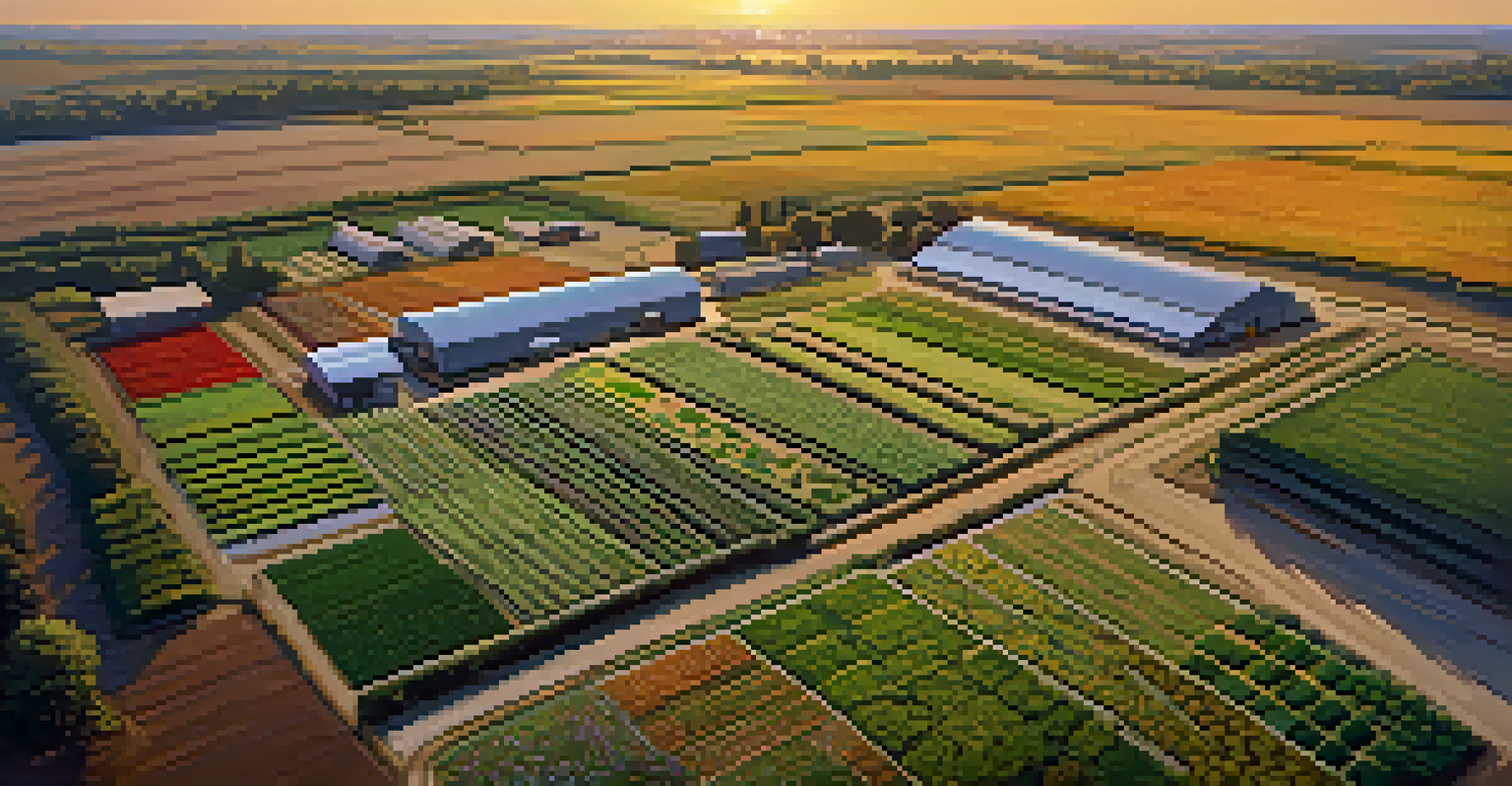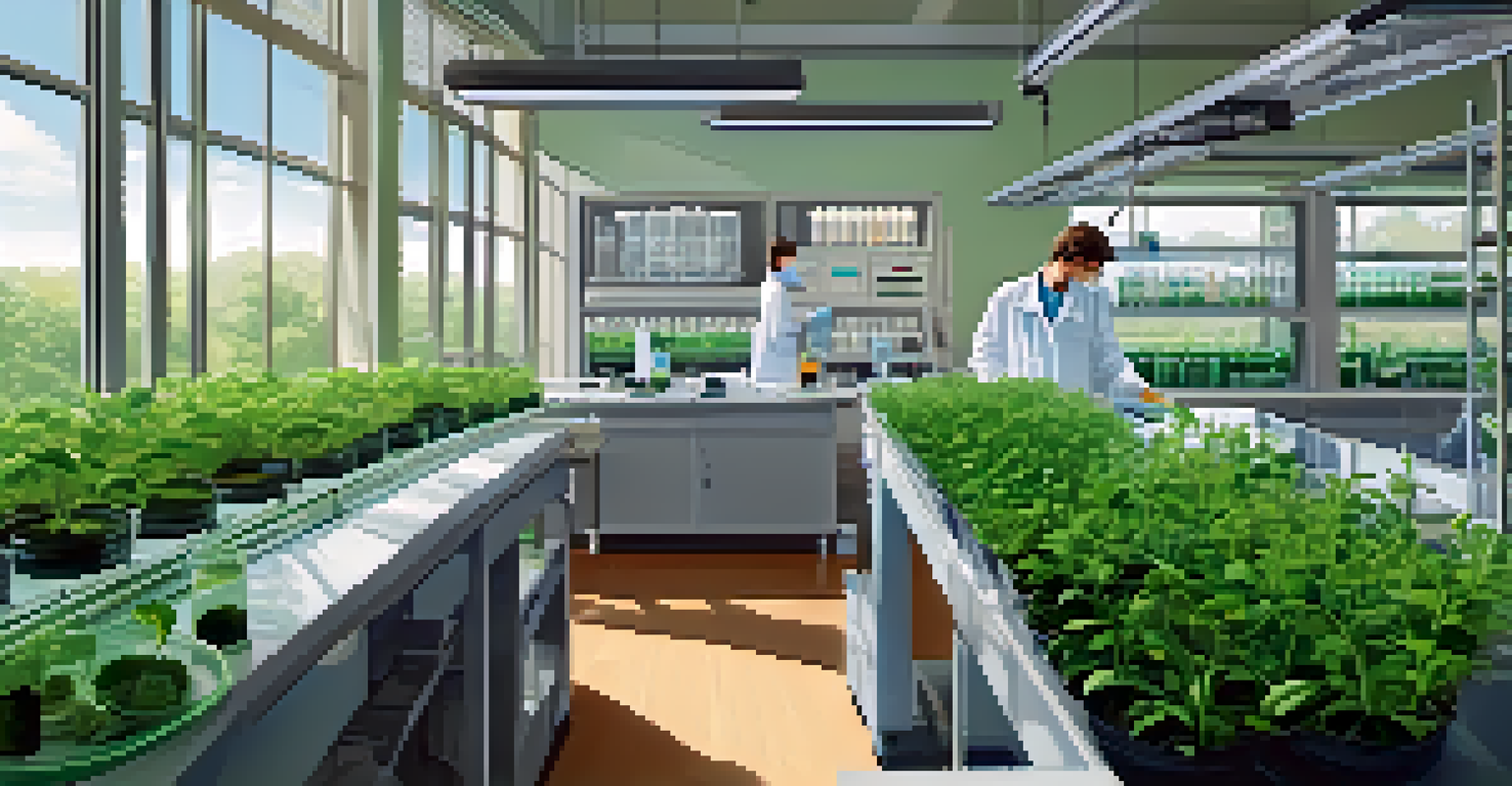Plant Genetics and Economic Implications in Trade

Understanding Plant Genetics and Its Role in Agriculture
Plant genetics involves the study of heredity and variation in plants. It plays a crucial role in agriculture by enabling scientists to develop crops that are more resilient to diseases, pests, and environmental stresses. For instance, genetic modification techniques can enhance crop yields, ensuring a stable food supply in the face of climate change challenges.
The greatest change in agriculture is not in the plow but in the seed.
By understanding the genetic makeup of plants, researchers can identify traits that are beneficial for cultivation. This not only helps in improving existing varieties but also in creating entirely new ones that could thrive in different conditions. For example, drought-resistant varieties are essential for regions facing water scarcity, thus securing food production.
In summary, the significance of plant genetics in agriculture cannot be overstated. Its application leads to improved crop varieties, which can significantly impact food security and sustainability, forming the foundation for economic growth in agricultural sectors.
The Economic Implications of Advanced Plant Breeding Techniques
Advanced plant breeding techniques, such as CRISPR and marker-assisted selection, have revolutionized how we approach agriculture. These innovations not only expedite the breeding process but also enhance the precision of developing desired traits in crops. As a result, farmers can benefit from higher yields and lower production costs, directly affecting their profitability.

Economically, these advancements can lead to increased competitiveness in global markets. Countries that adopt these technologies can produce higher-quality crops that meet international standards, opening up new trade opportunities. For instance, nations that invest in plant genetics may find their exports surging as they provide superior products to consumers worldwide.
Plant Genetics Boosts Crop Resilience
Advancements in plant genetics enable the development of crops that are more resilient to diseases, pests, and climate challenges.
Furthermore, the economic implications extend beyond individual farmers to entire nations. Countries that prioritize plant genetic research and development can foster agricultural innovation, driving economic growth and improving trade balances. This creates a ripple effect, bolstering local economies and enhancing food security.
Trade Dynamics: The Role of Plant Genetics in Global Markets
The global trade of agricultural goods heavily relies on the genetic quality of crops. Countries that leverage advanced plant genetics can offer products that are not only more resilient but also tailored to consumer preferences. This creates a competitive edge in international markets, where quality often dictates pricing and demand.
Biotechnology can help us to produce more food with fewer resources, and this is essential for feeding a growing population.
For example, the rise of genetically modified organisms (GMOs) has transformed trade dynamics. While some countries embrace GMOs for their benefits, others impose strict regulations, leading to a complex web of trade agreements. Understanding the genetic parameters of crops is essential for navigating these international regulations and maximizing trade benefits.
Ultimately, the intersection of plant genetics and trade illustrates how agricultural advancements can shape economic landscapes. By investing in genetic research, countries can ensure their produce meets market demands, thus fostering a thriving trade environment.
Challenges and Opportunities in Plant Genetic Trade
While plant genetics presents numerous opportunities, it also comes with its challenges. Issues such as intellectual property rights and the ethical implications of genetic modification can create barriers in trade. For instance, patenting plant varieties may restrict access for small farmers in developing countries, limiting their participation in global markets.
Moreover, public perception of genetically modified crops can impact trade flows. Consumer skepticism in various regions can lead to decreased demand for GMO products, affecting their marketability. This highlights the need for transparent communication regarding the benefits and safety of these products to foster consumer trust.
Economic Growth Through Innovation
Investing in plant genetic research fosters agricultural innovation, leading to enhanced trade opportunities and economic stability.
Addressing these challenges requires collaborative efforts among governments, scientists, and traders. By promoting responsible practices and fostering open dialogue, the agricultural sector can capitalize on the benefits of plant genetics while ensuring equitable trade opportunities.
The Future of Plant Genetics in Economic Development
The future of plant genetics is poised to play a pivotal role in economic development, especially in agriculture-dependent economies. As climate change continues to impact traditional farming practices, the need for innovative solutions becomes more pressing. Advancements in plant genetics can lead to the development of crops that are not only resilient but also tailored to specific environmental conditions.
Investing in plant genetic research can unlock new markets and create jobs within the agricultural sector. For instance, developing new varieties that can withstand extreme temperatures or pests can help farmers maintain productivity, even in adverse conditions. This, in turn, supports economic stability in rural communities reliant on agriculture.
In conclusion, the integration of plant genetics into economic development strategies can yield significant benefits. By focusing on sustainable practices and innovation, nations can enhance their agricultural sectors, improve trade relations, and contribute to global food security.
Case Studies: Successful Integration of Plant Genetics in Trade
Several countries have successfully integrated plant genetics into their trade frameworks, showcasing the potential for economic growth. For example, the Netherlands has transformed its agricultural sector by focusing on genetic research, becoming a leading exporter of high-quality flowers and vegetables. This strategic investment in plant genetics has propelled the country to the forefront of global agricultural trade.
Another example is India, which has adopted genetically modified cotton to combat pest problems. This shift has led to significant increases in cotton yields, enhancing the livelihood of farmers and boosting exports. India's success story illustrates how embracing plant genetics can lead to substantial economic benefits in agricultural sectors.
Navigating Trade with Plant Genetics
Understanding the genetic quality of crops is crucial for countries to thrive in global markets and meet consumer demands.
These case studies highlight the importance of strategic investments in plant genetics for trade success. By learning from these examples, other nations can develop their own agricultural strategies, fostering economic growth through innovation and enhanced crop quality.
Conclusion: Navigating the Future of Plant Genetics and Trade
As we look towards the future, the interplay between plant genetics and trade will only become more significant. The need for sustainable agricultural practices, coupled with rising global food demands, will necessitate continued innovation in plant genetics. By embracing these advancements, countries can secure their positions in the global market and contribute to food security.
Moreover, the ongoing discussions surrounding the ethical implications and regulations of plant genetics will shape the landscape of agricultural trade. Striking a balance between innovation and consumer safety will be crucial for the continued growth of this sector. This approach fosters an environment where scientific advancements can coexist with public trust and acceptance.

In conclusion, the journey of plant genetics in economic development and trade is just beginning. By prioritizing research, collaboration, and responsible practices, nations can harness the full potential of plant genetics, paving the way for a more sustainable and prosperous agricultural future.